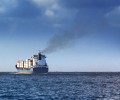
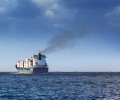
September ends with an important milestone of the Panama Canal towards decarbonization. The Panama Canal and more than 150 other organizations across the maritime value chain signed an industry-led call for world leaders to commit to decarbonizing international shipping by 2050. The leaders are going to support industrial scale zero emission shipping projects through national action and deliver the policy measures that will make zero emission shipping the default choice by 2030.
The signatories to the Call to Action for Shipping Decarbonization include many of the world’s largest actors in global trade: A.P. Moller – Maersk, BHP, BP, BW LPG, Cargill Ocean Transportation, Carnival Corporation, Citi, Daewoo Shipbuilding & Marine Engineering, Euronav, GasLog, Hapag-Lloyd, Lloyd’s Register, Mitsui O.S.K. Lines, MSC Mediterranean Shipping Company, Olympic Shipping and Management, Port of Rotterdam, Rio Tinto, Shell, Trafigura, Ultranav, Volvo, and Yara. Each signatory has made climate commitments and is taking concrete actions.
As cited in a new brief issued by the UN Global Compact Charting a 1.5 C Trajectory for Maritime Transport, the Panama Canal set their own decarbonization targets while also establishing initiatives to encourage shipping lines to minimize their carbon footprint, demonstrating actions that can be taken to accelerate decarbonization across the shipping value chain.
The Panama Canal’s aims to become carbon neutral by 2030 were officially announced in April 2021, however it began tracking its carbon footprint in 2013 with the intention of better aligning its operations to the global objectives of reducing emissions to mitigate and adapt to climate change.
Ahead of critical negotiations at COP26 this November, the Panama Canal, and other signatories of the Call to Action for Shipping Decarbonization now urge world leaders to:
- Commit to decarbonizing international shipping by 2050 and deliver a clear and equitable implementation plan to achieve this when adopting the IMO GHG Strategy in 2023.
- Support industrial scale zero emission shipping projects through national action, for instance by setting clear decarbonization targets for domestic shipping and by providing incentives and support to first movers and broader deployment of zero emissions fuels and vessels.
Deliver policy measures that will make zero emission shipping the default choice by 2030, including meaningful market-based measures, taking effect by 2025 that can support the commercial deployment of zero emission vessels and fuels in international shipping

Following this important step towards decarbonization, the ‘Getting to Zero’ members are going ahead to reveal their carbon credentials. The Call-to-Action signatories said they wanted incentives such as market-based measures put in place to accelerate the shift over to zero-emissions fuels, and for a clear and fair road map to decarbonisation to be drawn up by governments.
But the Getting to Zero audit of the 150 signatories of Call to Action showed that only 80 of them, or just over half, are currently offering full transparency on greenhouse gas emissions performance. The group said that emissions transparency is the “necessary first step in shipping decarbonisation”. Most of the group’s members also appear to be falling short of the commitments that they are now demanding from governments. Six signatories said they are aiming at full decarbonisation by 2040 and only 46, less than one third, said that they planned to achieve full decarbonisation by 2050.
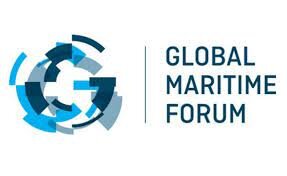
At the same moment with the milestone of Panama Canal, Poseidon Principles will raise its emissions compliance standards: The move follows the Global Maritime Forum’s Call to Action for Shipping Decarbonisation in which 150 signatories demanded governments match the ambitions of the Paris Agreement and target zero-carbon shipping emissions by 2050. So far 27 leading banks have signed up to the Poseidon Principles representing $185bn of ship finance. A key demand from the Call to Action is for governments to establish a price on carbon to encourage the transition to low-carbon fuels.
INDUSTRY ACTIONS
Lloyd’s Register acquires data intelligence firm: The British classification society has acquired GreenSteam, a marine data intelligence company specialising in improving vessel efficiency through machine learning. The acquisition will be integrated and managed by i4 Insight, a subsidiary of Lloyd’s Register. i4 Insight, part of LR’s Maritime Performance Services business, is a digital platform that allows shipowners, operators, and charterers to access insights on vessel performance and fuel consumption across their fleets.
Royal Caribbean eyes further emission cuts by 2025: After achieving its carbon reduction target of 35% compared to a 2005 baseline, American cruise holding company Royal Caribbean Group has committed to further reduce emissions by 25% by 2025 from 2019 levels. Apart from the emission reduction goal, the 2020 report documents that the company has met or exceeded nearly all its 2020 sustainability targets.
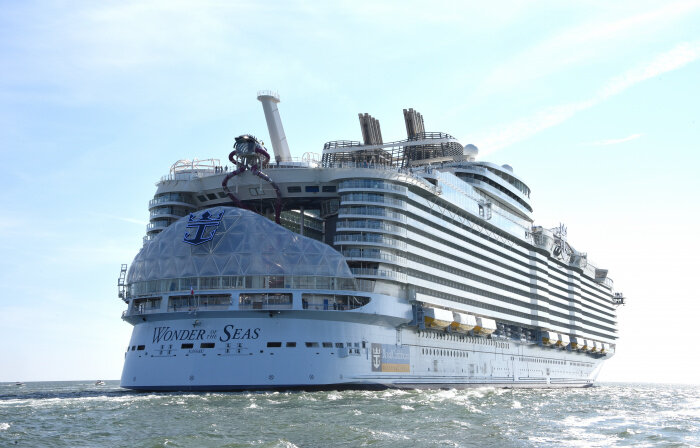
SHIPYARDS – CLASSIFICATION SOCIETIES
BV issued design approval for what will be the world’s largest VLGC: The ‘Panda 93P’ VLGC design has been developed by Jiangnan Shipyard, a Chinese gas carrier builder that is part of China State Shipbuilding Corporation (CSSC). Sinogas, a Singapore-based gas shipowner has placed a firm order for two of the 93,000 cubic metre (cbm) VLGCs, with options for three more vessels. Once delivered, these ships will be the largest VLGCs in the world and they will be powered by liquefied petroleum gas. Once in operation, the new design will reduce CO2 emissions by approximately 32% in comparison with the previous generation of 84,000 cbm VLGCs powered by low-sulfur fuel oil (LSFO). This reduction reflects the highly optimized design and economies of scale, as well as the use of LPG as fuel.
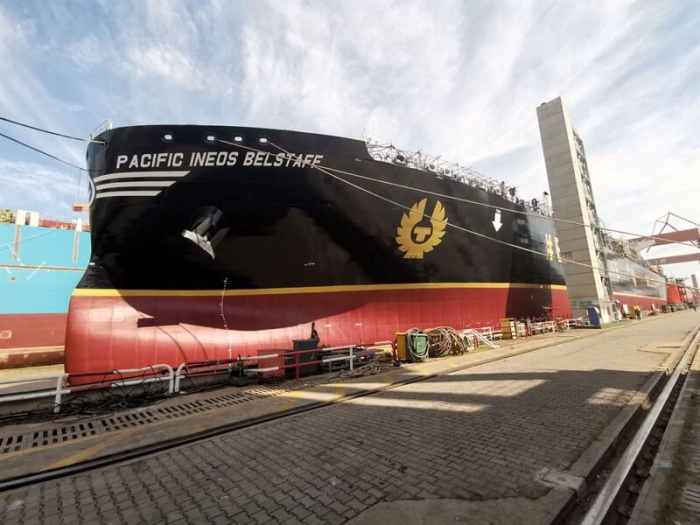
ABS granted approval in principle (AiP) to French engineering firm GTT and Finnish ship designer Deltamarin for the Aframax LNG tanker design: This new LNG-fueled tanker design uses GTT’s membrane tank technology. While GTT designed the tank, Deltamarin studied its integration into the vessel. The design provides a solution that complies with the International Maritime Organization (IMO) environmental regulations. Compared to a standard oil-fueled tanker, it reduces CO2 emissions by at least 20 per cent. It also offers increased autonomy without reducing the cargo volume
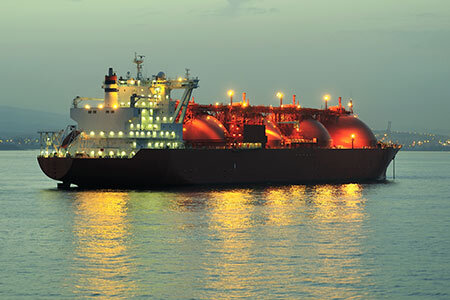
ABS, RMI grant AIP for next-gen liquified CO2 carrier designs: Liquefied CO2 carrier designs by South Korean shipyard Hyundai Mipo Dockyard (HMD) and its parent company Korea Shipbuilding and Offshore Engineering (KSOE) have been granted approval in principle (AIP) by classification society ABS and the Republic of the Marshall Islands (RMI) Maritime Administrator.
LR, HHI and KSOE to develop digital twin technology for LNG carrier: The agreement was signed at Gastech 2021 to support the digitalisation of the maritime industry and the growing demand for large-scale LNG carriers. As part of the MoU, KSOE and HHI will further develop Hyundai intelligent digital twin ship (HIDTS) for a type B gas containment tank suitable for a 174,000 cbm LNG Carrier.
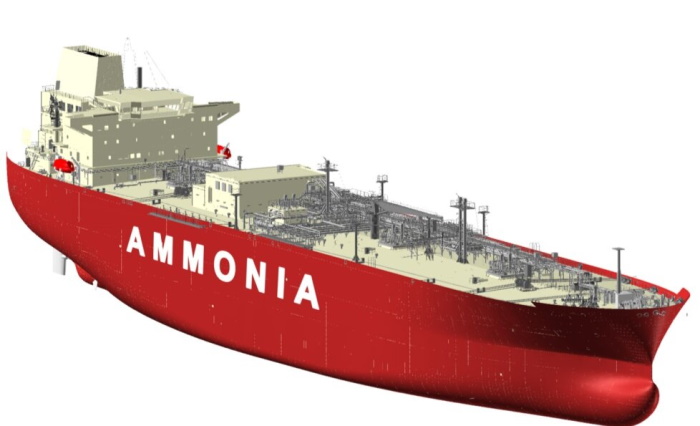
TECHNOLOGY
Hydrogen-ready wind turbine installation vessel design seals US approval: Ship designer Ned Project has won approval in principle (AiP) from American class society ABS for its hydrogen-ready wind turbine installation vessel (WTIV) design.
The NP20000X ULAM design is intended to be Jones Act compliant and able to meet future offshore wind market demands, involving 15-20 MW wind turbine installations. Its innovative approach loads monopiles vertically on the 8,000 sq m deck, eliminating the need to rotate monopiles to the vertical position at sea, ABS explained.
Wärtsilä and the Finnish–Swedish ferry operator Wasaline have signed a ten-year optimised maintenance agreement for the Aurora Botnia LNG-powered ferry: The parties signed the deal back in June 2021, but it became effective only in September. The Aurora Botnia is a 150-metre car and passenger ferry. It can run on both LNG and biogas (LBG), equipped with Wärtsilä engines. The ship’s propulsion is based on a hybrid solution featuring the Wärtsilä 31DF dual-fuel engine and batteries. The Wärtsilä 31DF will also be able to use BioLNG, a totally renewable fuel that can reduce CO2 emissions by up to 90 per cent. It emits no particulate matter, and close to zero levels of nitrogen oxides (NOx) and sulphur oxides (SOx).
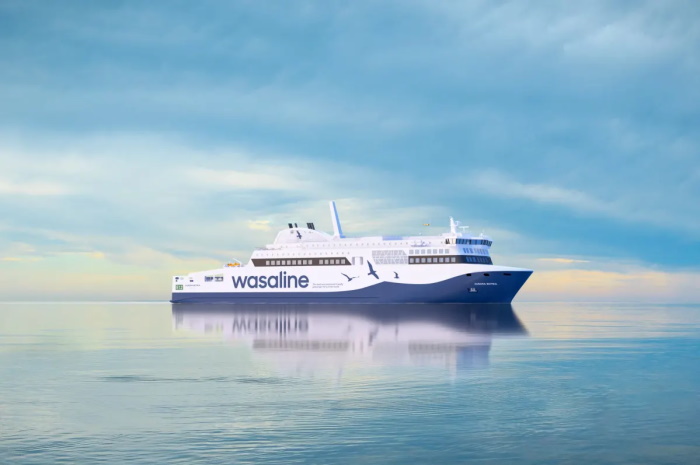
FUELS
A.P. Moller – Maersk speeds up eFuel development with latest investment in US start-up: The Danish shipping giant has made an investment in US-based startup company Prometheus Fuels focused on developing cost-efficient, carbon-neutral eFuels for shipping. This investment is made through Maersk Growth, the corporate venture unit of A.P. Moller – Maersk. The company expects several fuels to exist alongside in the future fuel mix and has identified 4 potential fuel pathways to decarbonization: biodiesel, alcohols, lignin-enhanced alcohols, and ammonia.
The investment supports its efforts with electrofuels which include alcohols produced from renewable energy. Along with biodiesel, alcohols including green methanol are feasible fuel technologies already today, according to the shipping giant.
Teco 2030 receives government aid for fuel cell production: Norwegian company Teco 2030 has been granted up to NOK 5.4m in indirect government support for developing its first semi-automated production line for hydrogen fuel cells at its new fuel cell factory and innovation centre in Narvik in northern Norway. The support has been granted through the Research Council of Norway’s Skattefunn scheme, which is a tax deduction scheme designed to stimulate research and development (R&D) activities in Norwegian companies. It provides indirect support in the form of tax deductions on costs related to implemented research and development activities.
 Source: Break Wave Advisors, by Maria Bertzelou https://www.breakwaveadvisors.com/insights/2021/9/27/shipping-decarbonization-weekly-insights
Source: Break Wave Advisors, by Maria Bertzelou https://www.breakwaveadvisors.com/insights/2021/9/27/shipping-decarbonization-weekly-insights